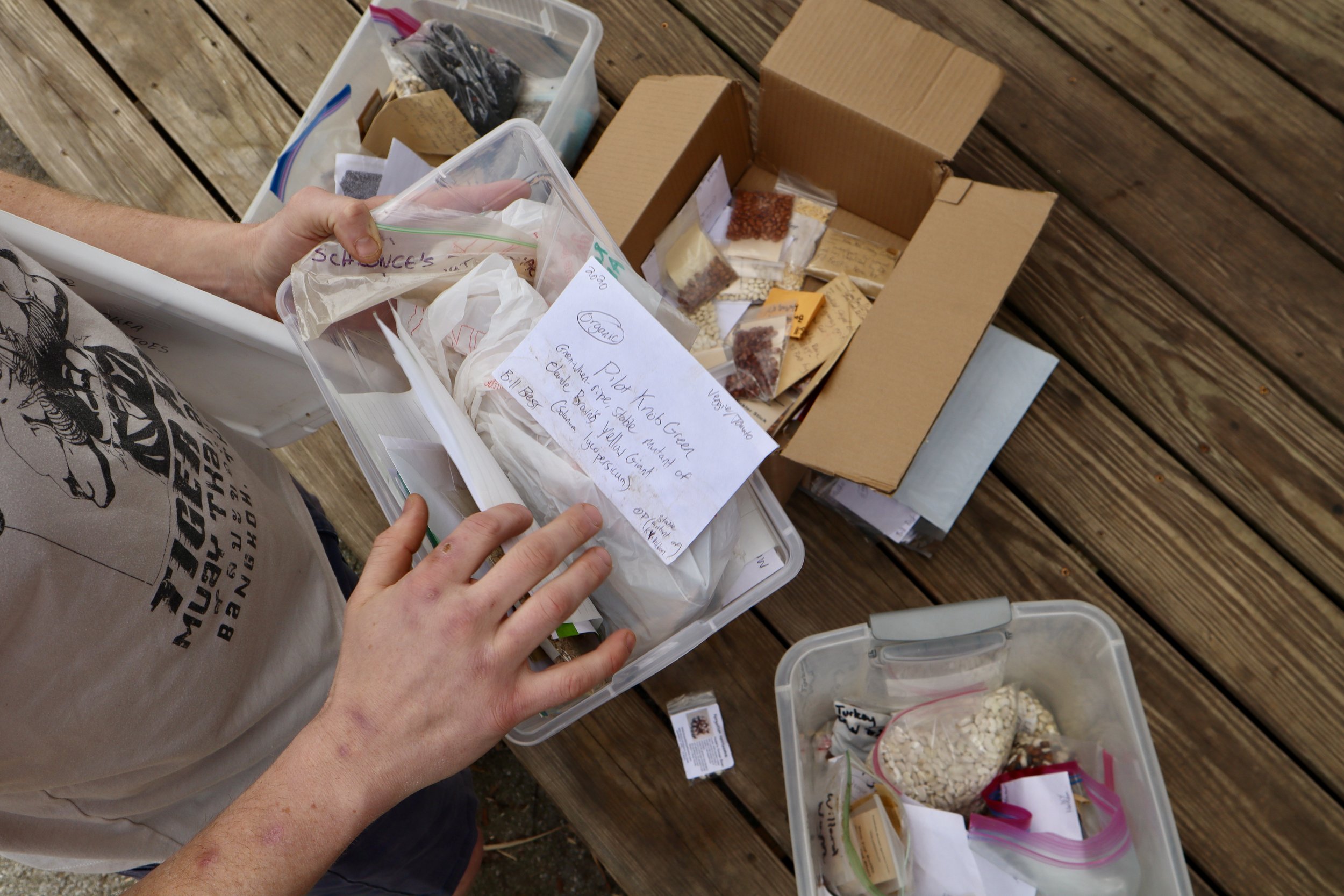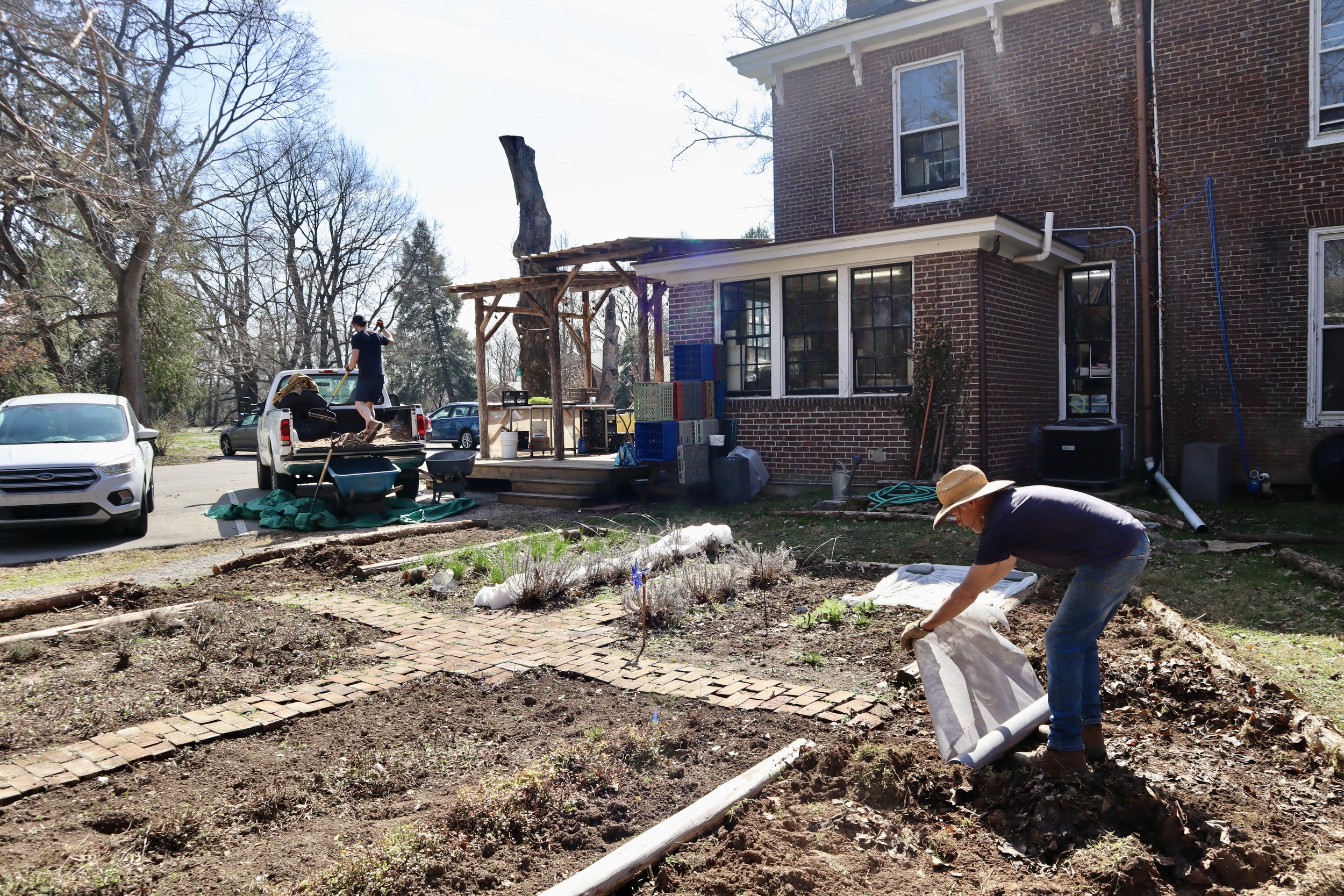Seed Saving
an heirloom series: part 1
story by Donna Hecker & photography by Talitha Schroeder
When we think of heirlooms, we usually picture a well-worn Irish linen tablecloth, Great-grandpa’s retirement watch, a mid-century atomic clock. They’ve survived at least a generation or two and someone thought enough of them (and us) to make sure such treasures ended up in the right hands.
It’s no less true of heirloom fruits and vegetables. In times when survival from one year to the next literally depended on families being able to retrieve and replant seeds, seed saving was a necessity.
These days seed catalogs are ubiquitous and most of us are more dependent on well-stocked grocery aisles than on whether or not a garden was tended. Yet there’s a reason we still appreciate the heft of a plump Cherokee Purple tomato or break up a mess of greasy beans.
Even the names of heirloom vegetables could easily write themselves into the lyrics of a folk song — Turkey Craw Beans, Serbian Elephant Ear Pepper, Barnes Mountain Orange Tomato, Ashe County Pimento.
Vegetables grown from commercially developed seed have essentially two goals: to go the distance and then once arrived, to hang around as long as possible until someone plucks them off the shelf or out of the bin.
Heirlooms, on the other hand, might be prized for their flavor or fertility; or for their nutritional value; for their hardiness in the field or garden; or drought-resistance; or for being the through-line to a long-ago ancestor. Or, indeed for all of these.
Our Holly Hill Inn DirtWorks gardener and cook Ian Feeback shared a funny story from Bill Best, renowned for his lifelong work preserving Kentucky heirlooms. To make a point, Mr. Best did a little batting practice with a wiffle bat, a store bought tomato, and one of his heirloom varieties. The store- bought tomato sailed off the bat into home run territory. The heirloom exploded on contact.
Having learned about seed saving from Mr. Best and others, Ian has started trays of plants from his own saved seeds ready to plant in our Buddha garden at Holly Hill Inn. We’re still a few weeks away since no Kentuckian would dream of putting summer vegetables in the ground until Derby Day has come and gone. Although climate change may soon end that tradition.
In fact, climate change was mentioned frequently by the seed savers we talked to. Farmer and forager Storey Slone pointed out that seed savers are becoming more focused on selecting for qualities like drought-resistance or warmer temperatures. She mentioned taro root being grown in North Carolina as one example.
For both Storey and Ian, their love for heirlooms goes deeper than looks or taste. As Ian says, “We’re preserving history, flavors, folkways. What got me all fired up was finding seeds from 1972 that I couldn’t get to germinate, and losing that plant. We’re losing lots of plants at an alarming rate and people should be worried because we can’t get them back.”
Storey looks at seed saving through the lens of sovereignty and access. “People should have access to plant varieties and genetics so they can pass them down – it’s an issue of who owns food. Heirlooms can be owned by anyone and passed down by anyone. They offer people the freedom to grow their own food.”
Cultural heritage is preserved through food. A family forced from Kosovo carried seeds for a Bosnian banana pepper variety to their new home in the US. Native Americans forced from their birthplace carried seeds for Cherokee White Eagle Corn and what became known as the Trail of Tears Bean. Enslaved persons forced through the Middle Passage brought okra, sorghum, black-eyed peas to North America.
Soon the plants that Ian has started from his saved seeds will be planted in our Buddha garden. We’ll watch them grow into Turkey Craw Beans, Zeke Dishman Tomatoes, Ashe County Pimento. Then our chefs will turn them into dishes with fanciful names, to be printed on multi-course dinner menus and served up to our guests.
When the vegetables have had their day in the sun and run on the menu, Ian will carefully collect the seeds from the best ones for next year. And we’ll start all over again, knowing that we’ve carried on for folks like Zeke Dishman from Windy, Ky. who spent a lifetime developing his large, flavorful red tomato, one of Bill Best’s favorites.
Because “Seeds are not just seeds. They’re like ancestors. They have a history. Seeds have stories.” Winona LaDuke, eco-activist
Seed-saving and Heirloom Variety Resources
https://www.seedsavers.org/why-save-seeds
https://theutopianseedproject.org/about/
https://www.kentuckypress.com/9780813183749/kentucky-heirloom-seeds/
Related Content
Digging Dirt Works
Staff farmer David Wagoner has launched DirtWorks. We’re going even deeper into our commitment to not only buying local, but growing local. DirtWorks is our initiative to garden at every Holly Hill and Co. restaurant, not just for the beauty that plants bring us, but for their culinary possibilities as well.
© 2023, Holly Hill Inn/Ilex Summit, LLC and its affiliates, All Rights Reserved




